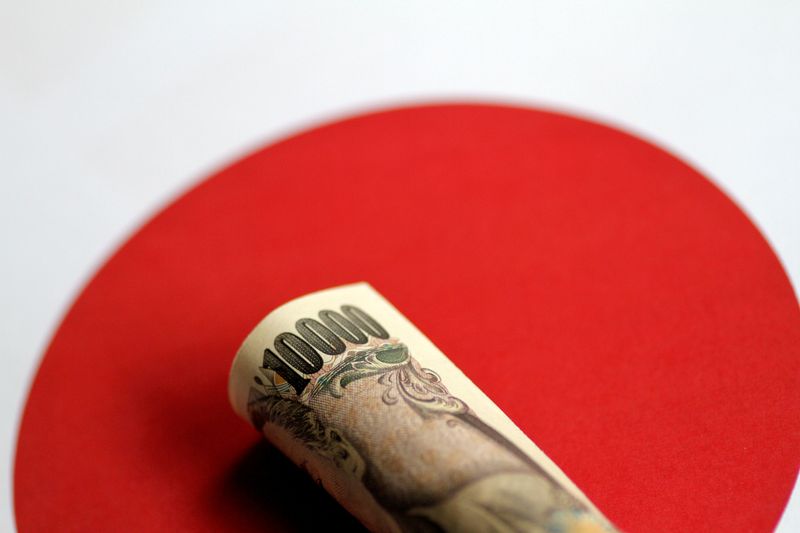By Tom Westbrook and Alun John
SINGAPORE/HONG KONG (Reuters) -Japan's government bond market is being pushed to breaking point in a contest between foreign speculators and the Bank of Japan, creating challenges for loan pricing and bond sales and raising the prospect of government financing tangles down the track.
Extreme stress was evident on Wednesday, when the Bank of Japan (BOJ) spent more than 700 billion yen ($5.2 billion) buying bonds to defend its 10-year yield ceiling, only to see 10-year futures suffer their steepest plunge in almost a decade. [JP/]
Prices have since rebounded, but liquidity is low, the yield curve is kinked at the 10-year tenor - diminishing its relevance as a pricing benchmark - and market makers fret that futures could become an unreliable hedge against other market risks.
"If you lose the function of the futures market, that's a huge problem for (JGB) auctions - you cannot really hedge your auctions ... dealers will all go away," said Naka Matsuzawa, a strategist at Nomura in Tokyo.
The long-somnolent market is suddenly creaking as speculators ramp up bets that the BOJ is going to adjust or abandon a de-facto cap of 0.25% on the 10-year yield.
Policymakers are under pressure since Japan is finally seeing the inflation that the ultra-easy settings were designed to achieve and as the yen tanks against almost every other currency as global central banks have been raising rates quickly.
"The BOJ doesn't really have to do anything, it has cover for not doing so and nothing is going to force its hand," said Ian Samson, a portfolio manager at Fidelity.
"But one pretty reasonable option is to start by widening the band to 0.5% as that helps take some heat out of the yen weakness and doesn't give too much to the speculators."
Samson said Fidelity opened some short bets on the 10-year government bond earlier in the week, figuring it was unlikely to rally much and could be dumped very hard if policy settings shift.
The BOJ concludes a two-day meeting on Friday with no changes expected but with government and other sources saying that further yen declines could prompt a response.
WILD WEDNESDAY
The trigger for Wednesday's rollercoaster ride was the BOJ's surprise buying at the seven-year tenor.
Market participants saw it as an attempt to squeeze out shortsellers from the futures market, since typically bonds with seven years to maturity are delivered to close futures contracts, and driving up their price was intended to force that trade.
But the opposite occurred. Shorts kept selling and spooked dealers dumped their holdings too, sending the 10-year futures price down two full points to 145.58. The contract has since recovered to 147.21.
"Now that the function of the futures is in question they needed to shut their positions right away," Nomura's Matsuzawa said of investors or dealers using futures as a hedge.
Wednesday's turnover was the highest in a year, but the unusual moves have also highlighted the backdrop of a market that has long been declining in functionality as BOJ buying has swollen its holdings to more than 40% of the entire market.
Monthly turnover has steadily dropped from more than $4 trillion in 2013 to less than $3 trillion in March, according to data portal Asian Bonds Online. Yield curve controls also mean the market is losing its relevance as a benchmark for debt pricing and loans.
"If that isn't working, that should be bad for the financial market as a whole," said Deutsche Bank (ETR:DBKGn)'s Japan economist Kentaro Koyama.
"Lower functionality could lead to lower participants ... from a long-term perspective it is challenging for stable public financing."
The trend is unlikely to reverse unless the BOJ does, with downward pressure growing on the yen in the meantime.
"Without verbal intervention, expectations could become even more pessimistic," said Joey Chew, a senior currency strategist at HSBC in Hong Kong in a note to clients.

"Ultimately, actual change to the yield differential is needed for a sustainable correction in dollar/yen, and that could come from changing market views about BOJ, the (Federal Reserve) or recession probability."
($1 = 134.3000 yen)